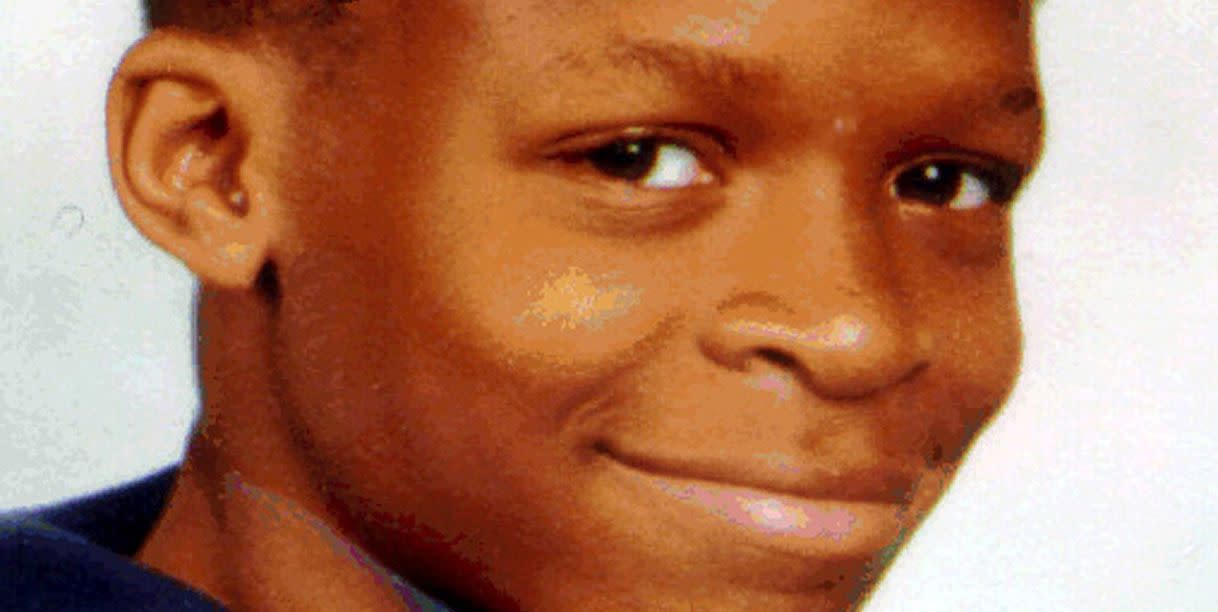Damilola: The Boy Next Door completely reframes the story – for the better

Note: The following article contains discussion of themes that some readers may find upsetting.
Damilola Taylor was just 10 years old when he was stabbed on the North Peckham Estate where he lived. He died not long after.
You're no doubt familiar with his name, and what happened to him, given the media attention. But what Channel 4's powerful new documentary Damilola: The Boy Next Door will soon show you is that might not know much of the real story at all.
The film is a huge and, in this case, necessary departure from the typical true-crime treatment we have become accustomed to. Danny and Ricky Preddie, who were themselves aged just 12 and 13 at the time of the killing, were eventually convicted of manslaughter, six years after Damilola's attack, in 2006. But this documentary does not spend very much time on them.
It also does not feed into harmful victim-blaming tropes, nor the racist undertones that have simmered underneath much of the conversation surrounding Damilola's circumstances since his name first hit the headlines in 2000.
Instead Damilola: The Boys Next Door paints a more nuanced and authentic picture of a young boy who, in many ways, was just your average ten year old with his whole life ahead of him.

Yinka Bokinni was Damilola's childhood friend, and they lived close to each other in the London housing estate. One year his senior, she has described him as being like a brother to her and her siblings. They would all play and often eat meals together – childhood memories which Yinka has described as "idyllic".
Following the death of Damilola, Yinka and her family – like many on the North Peckham Estate – were moved out and rehoused by the council. She did not return, or speak very openly about her former friend, until earlier this year, when she began work on Damilola: The Boy Next Door.
The film follows Yinka's journey towards confronting her own past and, simultaneously, that of Damilola's. She met with former neighbours and close friends, and others that grew up on the same South London estate.
What soon formed was a fuller and more vibrant picture of the place in which Damilola had lived and died. There was poverty, and it had problems with crime, it's true. But it also had heart and soul, and was remembered as a community-led place whereby those living next door would look out for each other and come together through the good and the bad.

Yinka confesses to seeing her own childhood through rose-tinted glasses, not understanding at the time that her mother's habit of making their clothes was because she could not afford to buy them.
Others had more of a realistic recollection, and it soon became all too clear that those who were housed in the North Peckham Estate were left there by an authority that did not care (or did not care to find out) about the dangers and unfit living conditions.
This was illustrated by a poignant moment towards the end of the Channel 4 documentary, which saw Yinka rifling through an archive of media reports relating to where she had grown up. Years before Damilola had even arrived there were warnings – in clear black and white print – about what was happening on the estate.
Muggings, heavy police presence and a milkman who refused to do his rounds. Words like "squalor", "danger zone" and "no-go area" dominated coverage of the North Peckham Estate, and yet this was a place where they sent families, with young children, to live.
After Damilola's death, the scrutiny was turned inward and those living in the estate were scapegoated and criticised. "You move people into hell and you call them devils," Yinka says.
It is disingenuous to blame those placed in the environment, rather than taking a long, hard look at the people that had the power to make a change before a child's death forced the issue.
But despite the clear systemic problems, Yinka reflected that two truths could co-exist: fond and happy memories of a childhood home, and acceptance that (in her words) "it was a violent place."
Damilola: The Boy Next Door does an excellent job of reframing the issues that were reflected in Damilola's story, while also allowing for a much more well-rounded understanding of who he was (and who, if he'd been allowed to grow up, he could have become).
"I wanted people to know that he wasn't destined to be a victim," she wrote of Damilola in a recent piece for the Guardian. "As someone from Peckham who has gone on to have a successful media career, I wanted to show that I am not the diamond in the dirt and that there is light and shade in every situation. I wanted to show his dad that he was loved and that his death wasn't inevitable because of where he landed."
Damilola: The Boy Next Door aired on Channel 4 and is available on All 4.
Digital Spy has launched its first-ever digital magazine with exclusive features, interviews, and videos. Access the latest edition with a 1-month free trial, only on Apple News+.
Interested in Digital Spy's weekly newsletter? Sign up to get it sent straight to your inbox – and don't forget to join our Watch This Facebook Group for daily TV recommendations and discussions with other readers.
You Might Also Like


